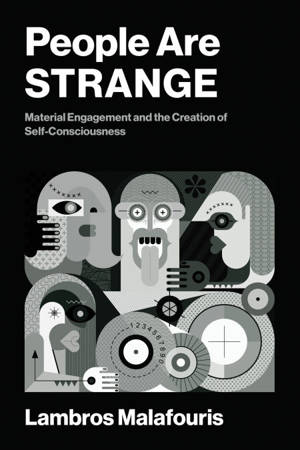
- Afhalen na 1 uur in een winkel met voorraad
- Gratis thuislevering in België vanaf € 30
- Ruim aanbod met 7 miljoen producten
- Afhalen na 1 uur in een winkel met voorraad
- Gratis thuislevering in België vanaf € 30
- Ruim aanbod met 7 miljoen producten
Zoeken
People Are STRANGE E-BOOK
Material Engagement and the Creation of Self-Consciousness
Lambros Malafouris
E-book | Engels
€ 73,92
+ 73 punten
Omschrijving
A groundbreaking exploration of self-consciousness through material engagement theory, redefining what it means to be human in a constantly changing world.
The making of human consciousness and the question of self-becoming presents a remarkable complication along the continuum of sentient matter. Self-consciousness is an oddity that both unites humans with and differentiates them from other modes of conscious existence. Lambros Malafouris’s evocative proposal is that people are STRANGE, which stands for the process of Situated TRANsactional Genesis, by which self-becoming is realized at the intersection of mind and matter. This book breaks new ground by applying material engagement theory expertly to questions about self-location, the subject-object division, and the nature of self-boundaries.
Malafouris argues that self-bounding (the process by which human ways of being are assembled, owned, or else bound to form what we call self or person) is rarely confined to a singular body. Our boundaries shift in response to the changing material environments and our modes of creative material engagement. Moreover, it is the bounding of consciousness that allows the unbounding of human thought and imagination. Self-bounding is the precondition for a borderless mind. Self-bound is thought-unbound. The theoretical upshot is that, rather than conceiving of self-consciousness as internal and ontological distinct from the material world, we must approach it as a continuous process fundamentally codependent with it.
The making of human consciousness and the question of self-becoming presents a remarkable complication along the continuum of sentient matter. Self-consciousness is an oddity that both unites humans with and differentiates them from other modes of conscious existence. Lambros Malafouris’s evocative proposal is that people are STRANGE, which stands for the process of Situated TRANsactional Genesis, by which self-becoming is realized at the intersection of mind and matter. This book breaks new ground by applying material engagement theory expertly to questions about self-location, the subject-object division, and the nature of self-boundaries.
Malafouris argues that self-bounding (the process by which human ways of being are assembled, owned, or else bound to form what we call self or person) is rarely confined to a singular body. Our boundaries shift in response to the changing material environments and our modes of creative material engagement. Moreover, it is the bounding of consciousness that allows the unbounding of human thought and imagination. Self-bounding is the precondition for a borderless mind. Self-bound is thought-unbound. The theoretical upshot is that, rather than conceiving of self-consciousness as internal and ontological distinct from the material world, we must approach it as a continuous process fundamentally codependent with it.
Specificaties
Betrokkenen
- Auteur(s):
- Uitgeverij:
Inhoud
- Aantal bladzijden:
- 352
- Taal:
- Engels
Eigenschappen
- Productcode (EAN):
- 9780262385633
- Verschijningsdatum:
- 2/02/2026
- Uitvoering:
- E-book
- Beveiligd met:
- Adobe DRM
- Formaat:
- ePub

Alleen bij Standaard Boekhandel
+ 73 punten op je klantenkaart van Standaard Boekhandel
Beoordelingen
We publiceren alleen reviews die voldoen aan de voorwaarden voor reviews. Bekijk onze voorwaarden voor reviews.








